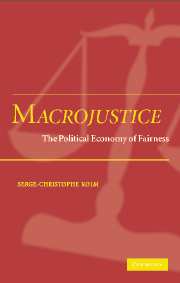Book contents
- Frontmatter
- Contents
- Presentation
- PART ONE BASES: CONSENSUS, FREEDOMS, AND CAPACITIES
- PART TWO OVERALL DISTRIBUTIVE JUSTICE: ELIE (EQUAL LABOUR INCOME EQUALIZATION)
- PART THREE COMPARISONS WITH POLICIES AND PHILOSOPHIES
- PART FOUR THE DEGREE OF COMMUNITY, EQUALITY, RECIPROCITY, AND SOLIDARITY
- 17 The degree of redistribution, solidarity, community, and reciprocity
- 18 Impartiality, consensus, and information
- 19 Disinterested judgments and the moral surplus
- 20 Communication and dialog
- 21 Impartialization to consensus
- PART FIVE COMPARISON WITH ECONOMICS' SOCIAL ETHICS
- References and bibliography
- Index
19 - Disinterested judgments and the moral surplus
Published online by Cambridge University Press: 31 July 2009
- Frontmatter
- Contents
- Presentation
- PART ONE BASES: CONSENSUS, FREEDOMS, AND CAPACITIES
- PART TWO OVERALL DISTRIBUTIVE JUSTICE: ELIE (EQUAL LABOUR INCOME EQUALIZATION)
- PART THREE COMPARISONS WITH POLICIES AND PHILOSOPHIES
- PART FOUR THE DEGREE OF COMMUNITY, EQUALITY, RECIPROCITY, AND SOLIDARITY
- 17 The degree of redistribution, solidarity, community, and reciprocity
- 18 Impartiality, consensus, and information
- 19 Disinterested judgments and the moral surplus
- 20 Communication and dialog
- 21 Impartialization to consensus
- PART FIVE COMPARISON WITH ECONOMICS' SOCIAL ETHICS
- References and bibliography
- Index
Summary
ERASING SELF-INTEREST FROM JUDGMENTS ABOUT DISTRIBUTIONS: THE METHODS
The just, global distribution determined by endogenous social choice derives from individuals' conceptions of justice, and only from this part of their overall judgments. Hence, it should not be directly influenced by individuals' special relation to their own interest. Individuals' self-interested judgments should therefore be banned from the individuals' evaluations on which the global evaluation is based: the individuals'overall judgments used should be laundered for their self-interest, or individuals'non-self-interested evaluations should be singled out from their overall judgment for use in the global evaluation. Not uncommonly, individuals have a dual standard, one self-interested and the other moral and impartial, which they express in different occasions. However, individuals also often have an integrated view resting on both motives, and the relative importance they attach to them can be very varied. Individuals also have preferences favouring the situation of particular others for reasons irrelevant to impartial justice, notably the closeness of the social relation with them. This extends self-interest into self-centeredness. No practical effect results if this concerns family altruism because an individual's income is in fact her household's. Self-centeredness is more generally considered in Section 4.4, and in Chapter 21 where it will be the basis of one method of solution.
Erasing the self-interested motive in the individuals' evaluations can be done in various ways. One can analyze the structure of the overall preferences of each individual and try to discriminate among the effects of various motives for banning those of self-interest.
- Type
- Chapter
- Information
- MacrojusticeThe Political Economy of Fairness, pp. 304 - 323Publisher: Cambridge University PressPrint publication year: 2004



